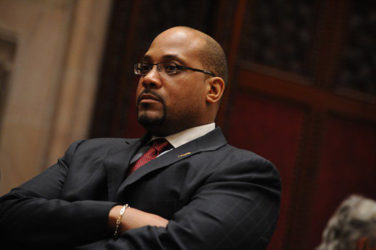Former New York State Senator John Sampson, who was convicted last year for obstructing justice and lying to federal investigators due largely to the testimony of US-based Guyanese businessman Ed Ahmad, is seeking to have his conviction overturned but federal prosecutors are vigorously fighting his bid.
According to the Albany Times Union, Sampson, whose sentencing is currently scheduled for July 20 after several postponements, has moved to have the conviction overturned based on a recent US Supreme Court decision in the case of former Virginia Governor Bob McDonnell.
The report said that the unanimous McDonnell decision, issued by the court on June 27, tightened the definition of prosecutable official acts by elected officials to exempt the sort of basic services for constituents that politicians or their staffers perform every day.

Following this, Sampson’s lawyers argued in court papers, filed earlier this month, that while he was not convicted of bribery under the statute retooled by the McDonnell decision, potentially prejudicial testimony offered at his trial concerned acts that fit the old definition of potentially corrupt official behaviour and not the tighter new legal measure.
Sampson, the former leader of the Democratic Conference, was convicted in July, 2015, for obstructing justice and lying to federal investigators in a case that revolved around his alleged embezzlement of funds from foreclosed properties, which he handled as part of his private legal career.
The report described Ahmad as a friend and supporter of Sampson who testified that the lawmaker enlisted him to help cover up the embezzlement through a US$188,500 “loan” that was allegedly repaid with official favours.
In a letter to federal Judge Dora Irizarry, prosecutors from the Eastern District said the defence’s arguments were deficient for several reasons, not the least of which was that the acts committed by Sampson on Ahmad’s behalf went far beyond what a lawmaker would do for the average constituent.
“The defendant did not merely sell Ahmad access to himself or to other government officials, or perform ‘run of the mill constituent services’ for Ahmad,” the prosecutors state. “Rather, the defendant repeatedly abused his position by pressuring and advising other officials not only to meet with Ahmad or consider his interests generally, but also to take concrete steps that would have particularly benefitted Ahmad.”
The Times Union also said that those acts included Sampson interceding on Ahmad’s behalf with a variety of municipal and state entities, including the New York City Department of Environmental Conservation (which was considering a sewer permit for a Queens property owned by Ahmad), the Department of State and the state Banking Department (which were auditing Ahmad’s businesses) and banks that Sampson urged to hand real estate brokering business to Ahmad.
Ahmad himself is set to be sentenced on September 14 but this may be further pushed back as his lawyers have repeatedly sought and been granted postponements for the sentencing based on the delay in the former senator’s sentencing.
The postponement to September is the sixth granted to Ahmad. The first postponement from January 15, 2016 to February 12, 2016, was a result of an oversight by a probation officer.
The other adjournments, from February 12 to March 4 to March 21 and then April 25, were as a result of various applications by counsel for Ahmad.
In May, Ahmad’s lawyer Steven Kartagener sent a letter to Judge Irizarry in which he sought the deferral because of the postponement of the sentencing of Sampson to July. Kartagener had also in April sought the deferral of sentencing to June 10 to benefit from Sampson’s sentencing, which was originally set for May. In that earlier letter, he had said, “By granting this adjournment, the Court would be permitting (Ahmad) to get the benefit (of) his literally hundreds of hours served as a cooperator, which will undoubtedly be chronicled at length in the government’s anticipated 5K1 letter….”
The 5 K1 letter is usually filed by the US government when a defendant provides substantial assistance in the solving of other cases and the government then seeks a reduction in the sentence.
Ahmad’s case has attracted great interest in Guyana because of his close ties to former president Bharrat Jagdeo. Ahmad had shipped a container of goods to Jagdeo at State House and many questions were asked about this.





